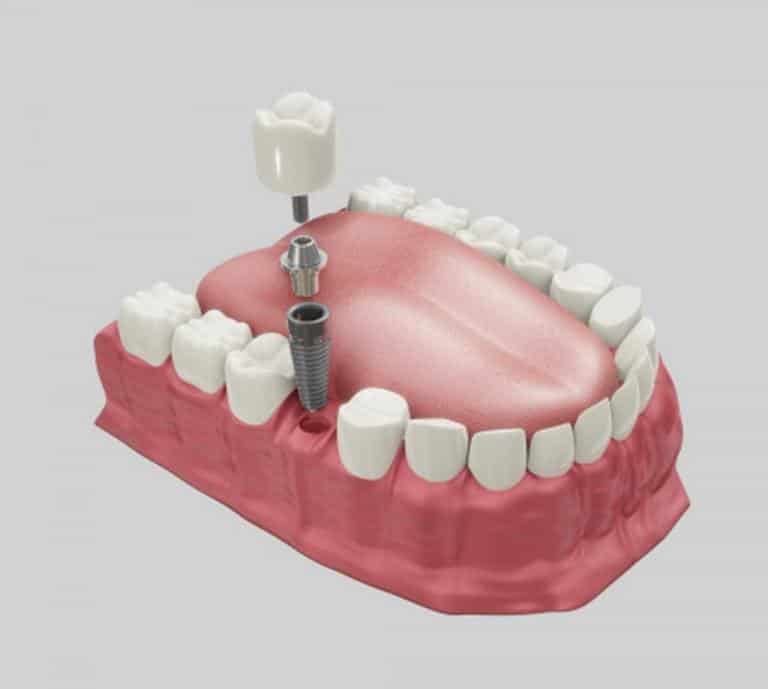
Dental Implants
What are Dental Implants?
Dental implants are artificial tooth roots that are placed into the jawbone to support a replacement tooth or bridge. They are typically made of titanium and are surgically implanted into the jawbone by a dental specialist.
Once the implant is placed, the surrounding bone and tissue will gradually grow around it and fuse to it, providing a sturdy and stable foundation for a replacement tooth. Dental implants are a popular and effective option for replacing missing teeth because they offer a long-term solution that looks, feels, and functions like natural teeth.
In case of multiple teeth loss, fixed prosthesis can be used instead of removable prostheses thanks to the implant, thus ensuring quite comfortable and aesthetic results. Thanks to implant treatment, people who suffer from tooth loss can achieve aesthetic, natural looking and most importantly long-lasting and strong teeth as their own teeth.

Types of Dental Implants
There are several types of dental implants available, including:
Endosteal implants
These are the most common type of dental implant and are placed directly into the jawbone. They are typically shaped like small screws, cylinders, or plates.
Subperiosteal implants
These implants are placed under the gum but on top of the jawbone. They are used when there is not enough healthy jawbone to support an endosteal implant.
Zygomatic implants
These implants are longer than other types of implants and are anchored in the cheekbone, or zygoma, instead of the jawbone. They are used in cases where there is not enough healthy jawbone to support other types of implants.
All-on-4 implants
This is a specific technique that uses four implants to support a full arch of replacement teeth. It is often used for people who have lost most or all of their teeth.
Your dental specialist can help determine which type of dental implant is best suited for your individual needs and situation.
Benefits of Dental Implants
There are several benefits of dental implants, including:
Improved appearance: Dental implants look and feel like natural teeth, providing a more natural-looking and attractive smile.
Enhanced comfort: Dental implants are designed to fuse with the jawbone, providing a stable and secure foundation for replacement teeth that eliminates discomfort and slippage associated with other tooth replacement options.
Improved speech: Dental implants do not slip or move like dentures, which can help improve speech and pronunciation.
Better eating: Dental implants function like natural teeth, allowing for more comfortable and efficient chewing and improved dietary choices.
Improved oral health: Dental implants do not require the removal of healthy tooth structure, which can help preserve adjacent teeth and support overall oral health.
Long-lasting solution: With proper care and maintenance, dental implants can last a lifetime, making them a cost-effective solution for tooth replacement.
Overall, dental implants offer a variety of benefits that can significantly improve the quality of life for those who have lost one or more teeth.

Are Dental Implants Right for You?
Dental implants may be a good option for you if:
- You are missing one or more teeth.
- Your jawbone has reached full growth.
- You have adequate bone density to support the implant or are a candidate for bone grafting to build up the bone.
- You have healthy gums.
- You are committed to maintaining good oral hygiene and follow-up appointments with your dental specialist.
- You do not smoke or are willing to quit smoking during the dental implant process.
However, certain medical conditions such as uncontrolled diabetes or radiation therapy to the jaw may make dental implant placement less successful. It's important to discuss your medical history and overall health with your dental specialist to determine if dental implants are a good option for you.
The Dental Implant Procedure
The dental implant procedure typically involves several stages and may take several months to complete. Here's an overview of the process:
Consultation
Your dental specialist will evaluate your oral health, take X-rays, and create a treatment plan that addresses your specific needs.
Implant placement
During this stage, the implant is surgically placed into the jawbone. After the procedure, you will need to wait several months to allow the implant to fuse with the jawbone in a process called osseointegration.
Abutment placement
Once the implant has fused with the jawbone, a small connector called an abutment is attached to the implant. This will serve as the attachment point for the replacement tooth or teeth.
Replacement tooth placement
After the abutment is in place, a replacement tooth or teeth, such as a crown, bridge, or denture, will be attached to the abutment.
Throughout the entire process, your dental specialist will work with you to ensure your comfort and ease any pain or discomfort associated with the procedure. You will also receive detailed aftercare instructions to help promote healing and ensure the long-term success of your dental implant.
Recovery and Aftercare for Dental Implants
Recovery and aftercare are important for ensuring the success of dental implants. Here are some tips for post-implant care:
Follow your dental specialist's instructions: Your dental specialist will provide detailed instructions on how to care for your implant and what to expect during recovery. Follow their instructions carefully to ensure a successful outcome.
Take pain medication as prescribed: You may experience some discomfort or pain after the implant procedure. Your dental specialist may prescribe pain medication to help manage any discomfort.
Stick to a soft food diet: For the first few days after the procedure, stick to a soft food diet to avoid irritating the implant site.
Keep the area clean: Follow your dental specialist's instructions for cleaning the implant site to prevent infection. Brush and floss carefully, and use an antibacterial mouthwash as recommended.
Avoid smoking: Smoking can slow down the healing process and increase the risk of implant failure. Avoid smoking during the recovery period.
Attend follow-up appointments: Attend all scheduled follow-up appointments with your dental specialist to monitor the healing process and ensure the long-term success of your dental implant.
With proper care and attention, dental implants can last a lifetime and provide a long-term solution for missing teeth.
Maintaining Dental Implants: Tips for Longevity
Maintaining proper care of your dental implants is crucial for their longevity. Here are some tips for maintaining your dental implants:
Practice good oral hygiene: Brush and floss regularly to keep your teeth and gums healthy. Use a soft-bristled toothbrush and non-abrasive toothpaste to avoid damaging your implant.
Use an antibacterial mouthwash: Rinse your mouth with an antibacterial mouthwash to help prevent infection and keep your mouth fresh and clean.
Visit your dental specialist regularly: Attend regular checkups and cleanings with your dental specialist to monitor the health of your implant and detect any issues early.
Avoid chewing on hard objects: Chewing on hard objects such as ice or hard candy can damage your implant or restoration. Stick to softer foods and avoid biting down on hard objects.
Wear a mouthguard: If you participate in contact sports or grind your teeth, wear a mouthguard to protect your implant and surrounding teeth.
Quit smoking: Smoking can increase the risk of implant failure and other oral health problems. Quitting smoking can help improve the health of your implant and overall oral health.
By following these tips and maintaining proper care of your dental implant, you can enjoy a healthy, functional smile for years to come.
Dental Implants vs. Other Tooth Replacement Options
There are several tooth replacement options available, but dental implants offer some unique advantages compared to other options. Here's a comparison:
Dental implants vs. dentures
Dentures can be uncomfortable and require adhesive to stay in place. They can also slip or shift, which can be embarrassing and affect speech. Dental implants, on the other hand, are securely anchored in the jawbone and function like natural teeth.
Dental implants vs. bridges
Bridges require the support of adjacent teeth, which can compromise their structural integrity. Dental implants, on the other hand, are self-supporting and don't require support from adjacent teeth.
Dental implants vs. partial dentures
Partial dentures can be uncomfortable and can cause sore spots on the gums. They also require frequent adjustments as the mouth changes over time. Dental implants, on the other hand, are permanent and don't require any adjustments once they are in place.
Dental implants vs. root canals
Root canals are performed to save a damaged or infected tooth. While root canals can be effective, they may not always be successful and may require retreatment or extraction. Dental implants provide a permanent replacement for a missing tooth without the risk of further damage or infection.
Overall, dental implants offer a permanent, natural-looking and functioning tooth replacement option with a high success rate and minimal risk of complications.

